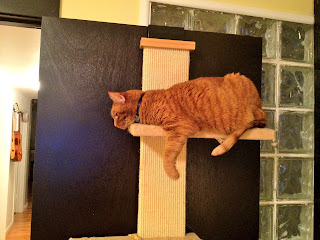Despite my love for them, my animal companions are constantly trying to find new and more costly ways to die.
In the last 48 hours,
Betelgeuse, my three-year old 12 lb. spitz, came down with a case of Hemorrhagic Gastroenteritis, more affectionately known by those in the field as "HGE." I would rank this death attempt in second place behind last year's
rat poison consumption.
Spoiler Alert: Betel is feeling much better now. (Not all dogs are so lucky, RIP
Ansel.)
Our timeline:
00:00 Hours. Out of nowhere, Betelgeuse threw up her dinner in our bed. We cleaned it up. Then she threw up in the bed again. And again. And then on the floor. And then again.
08:00 Hours. We woke up for the day, although I'm not sure that we actually slept. For every sip of water Betelgeuse would take, she would throw up three times.
Lulu, our control variable, was fine. Kyler and I reluctantly went to work. I checked in on Betel every hour or so on the
webcam.
16:30 Hours. Kyler got home from work. Betel refused to eat anything, including tasty things like cooked chicken.
18:30 Hours. I got home from work. Betel drank some water and threw up several times. And then she had bloody diarrhea. For those of you new to animal companions or stumbling on this page from a Google search,
in the event of bloody diarrhea, seek veterinary care immediately.
19:00 Hours. At the vet. Blood work (
$35.00) and x-ray (
$145.00). X-ray was fine, but blood work revealed an elevated hematocrit level, which is how Betel got her HGE diagnosis. She was given subcutaneous fluids for dehydration (
$45.00), a cerenia injection (anti-nausea medicine) (
$47.00), and a famotidine injection (an H
2 blocker, which decreases the amount of acid made in the stomach) (
$35.00). We were told to monitor her overnight, and we made a follow-up appointment in the morning for additional blood work and more subcutaneous fluids.
32:20 Hours. More bloody diarrhea, right outside the vet's office. I took a picture of it with my iPhone to show the vet, which offended my husband. I will spare your eyes and not post it here, but you can
email me if you want to see it. (And I know that some of you want to see it since "bloody diarrhea" is the search term that brought you here. Note that in my email response to you, I will advise you to seek veterinary care immediately.)
32:30 Hours. At the vet again. Blood work (
$35.00) and subcutaneous fluids (
$45.00). Betel's hemocrit level was lower, although still slightly elevated. The vet said she could be treated on an outpatient basis and gave us medication for the next several days -- cerenia (anti-nausua) (
$25.00) and flagyl (antibiotic effective against anaerobic bacteria and certain
parasites/anti-diarrheal) (
$16.25). Kyler and I played with Leo the ferret and stunk for the rest of the day.
34:00 Hours. Betelgeuse ate boiled chicken and white rice. I decided to work from home. Betel proceeded to sleep all day. No vomit. No diarrhea.
41:00 Hours. She retrieved a ball from somewhere and tried to get me to play. When I refused on account of work, she groomed Lulu. She was clearly feeling better.
42:00 Hours. She ate more boiled chicken and white rice with no adverse side effects. She got her first at-home doses of the cerenia and flagyl.
45:00 Hours. We are still waiting on a bowel movement from Betel. And in the meantime I decided to blog about HGE in case any other pet owners out there are faced with these same sudden, inexplicable gastrointestinal symptoms.
* * * * * * * * * * * * * * * *
Hemorrhagic Gastroenteritis ("HGE")
Symptoms: Sudden, profuse vomiting,
bloody diarrhea, anorexia, depression. Elevated hemocrit levels in blood, but no fever and a normal
white blood cell count.
Causes: Uncertain.
Contagious: No.
Treatment: Intravenous fluid therapy to replace lost fluid volume. Symptomatic treatment of vomiting and diarrhea. Antibiotics targeting
C. perfringens.
Level of seriousness: The progression of HGE is so rapid that hypovolemic shock and death can occur within 24 hours if untreated. Mortality is high in untreated dogs. Less than 10% mortality with treatment.
Recurrence: 10-15% of cases will recur.
* * * * * * * * * * * * * * * *
We could have saved $145 if we turned down the x-ray, but at that point I wasn't sure that Betelgeuse hadn't eaten something weird that was lodged in her intestines. I wasn't sure of anything. But whatever. With the help of our
trusty veterinarian, and for a mere
$428.25 (ugh.), we thwarted another death attempt and can rest easy. For now.







































.JPG)

.JPG)
.JPG)




.JPG)
.JPG)


